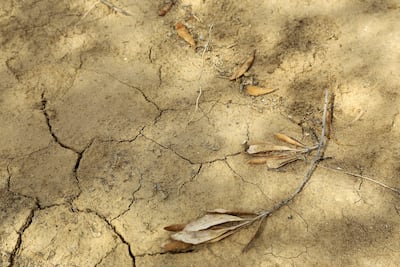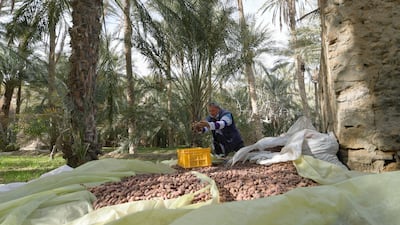Attempts to invest in green energy projects in Tunisia are harming domestic agricultural activities and risk making food insecurity and hydric stress in the country worse, rights groups said on Thursday.
Like many other North African countries, Tunisia has been trying to attract co-operation from Europe and around the world to harness its climate to produce renewable green energy, including solar and wind power.
In recent years, Tunisia has set up framework and legal regulations to implement a national strategy that promises at least 30 per cent of its energy will be from renewables by 2030.
In July, Tunisia and the EU signed an agreement for green hydrogen to be produced in Tunisia from solar and desalinated water energy sent to Europe through four existing gas pipelines.
In 2022, the European Commission approved plans to construct an underwater power line to transport clean energy from Tunisia to Italy.
European Commission President Ursula von der Leyen said strengthening green hydrogen trade between the two parties was a win-win situation.
On Thursday, state news agency Tap said a German delegation specialising in renewable energy production had arrived in Tunisia on Tuesday to meet officials from the Ministry of Industry, Mines and Energy, as well as the Tunisian Company for Gas and Electricity.
The parties were expected to discuss the prospects of using solar power to produce green hydrogen in Tunisia with the purpose of transferring it to Germany and the EU.
Taking advantage
However, experts and environmental activists in Tunisia have raised several questions about the fairness of the deal and warned that a green transition in the proposed format might exhaust the country’s natural resources and put living conditions at risk for future generations.
“The question is not about the outcome [of green energy production] but how we will be reaching the possibility of taking advantage of it without harming the local population,” the Working Group for Energy Democracy said in Tunis on Thursday.
The group said over the past decade, Tunisian officials have been changing the legal nature of agricultural lands to forest lands to allow its exploitation by foreign private investors for the production of green energy.
The change mainly affected lands known as “common-ownership lands” in the Tunisian south, which operates under a system that has been in place for decades and maintained homogeneity in the local communities that could commonly take advantage of it for farming activities, the main source of income in most of these regions.
However, after Tunisia's independence, the state began to place some of the lands under government ownership without providing alternatives for farmers.
With green energy investment becoming more tempting for other countries, authorities took over more lands in the south as well as the north-east, offering loose contracts to previous owners, which gave them little in the way of compensation while granting foreign investors the right to use those lands for periods of up to 30 years.
“These contracts lack transparency ... in [the town of] Chenini in Tataouine, farmers were compelled to sign agreements that would allow foreign companies to take advantage of their lands for a period of four years for green energy production,” Essia Guevzi, project officer at Hivos international development organisation and a representative of the Chenini farmers, said on Thursday.
Ms Guevzi said that farmers were offered only 1,200 Tunisian dinars ($383) a year for their lands, each of which occupy a space of at least 500 hectares, with the possibility of automatic contract renewal every year.
Farmers are also unable to pursue their agricultural activities during the span of the contract period.

Another risk of green energy production projects, say critics, is the exhaustion of water resources that are already in short supply in Tunisia.
Situated in areas near agricultural wells, farmers in Chennini and other regions fear that the quota they use to ensure the sustainability of their activity might be exploited.
Producing one kilogram of green hydrogen could need nine litres of water, according to estimates.
The majority of green hydrogen production would be exported to Europe and countries of investing companies, because Tunisia cannot benefit from its use because it does not have the infrastructure to use it.
The Tunisian Electricity and Gas Company (Steg), has been struggling with the effects of the economic crisis in Tunisia and a debt of more 3.6 billion dinars ($1.15 billion) has affected its capacity to maintain and modernise the network and put it at risk of bankruptcy.
Tunisia suffered a nationwide power cut on Wednesday after a malfunction at the country’s main power plant in the capital Tunis.
No alternative to losing livelihoods
Brahim Ben Abdallah, a farmer from Redeyef in south-west Tunisia, told The National that a 400-hectare common-ownership land in Segudoud municipality was confiscated in 2015 without the consultation of the owners to rent it to a German company for green energy production.
The problem, however, is that neither the company nor the state have bothered to consider passing any arising benefits to the residents of the region.
“Our problem is not with green energy, our problem is with the fact that we saw nothing from these companies, they gave nothing to the region, not even hiring local workers,” Mr Ben Abdallah told The National.
Tunisia has a 15.6 per cent unemployment rate as of June 2023, according to the National Statistics Institute. Higher percentages are mainly observed in interior regions where development is limited.
Mr Ben Abdallah said that the production of renewables in Tunisia would not have been a controversial matter if Tunisian companies were the ones to use the lands and pass the benefit frm that use on to the country. However, giving their lands to European and foreign companies as well as water resources and Steg's power structure for the product to be eventually taken abroad is a stretch.
“Citizens have the right to work on their land and bring benefits to both their region and the whole country,” he said.
Several remote regions in Tunisia still struggle to provide stable power to their towns, primarily caused by the worn-out electricity network cables.
In summer, water cuts happen often when the network suffers from the increased demand caused by the use of air conditioners in hot weather.
Tunisia is also dependent on gas imports from Algeria to generate its electricity, making it a priority for the country to find an alternative to reduce that dependency.


